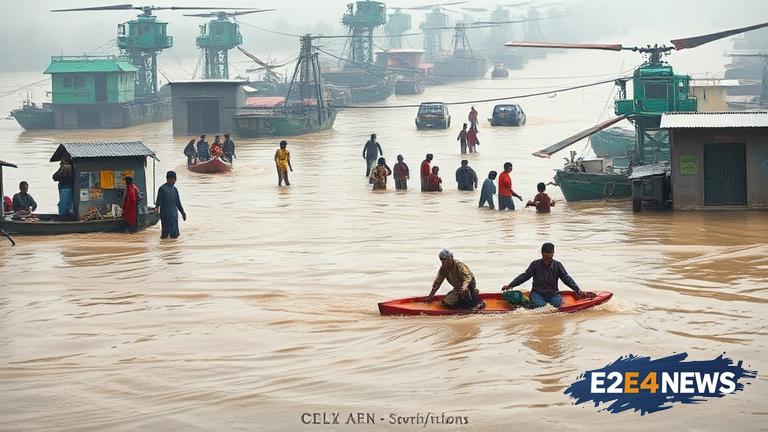A severe flood crisis is unfolding in Pakistan as India releases excess water from its swollen rivers, affecting thousands of people and causing widespread damage to infrastructure and agriculture. The Pakistani government has evacuated thousands of people from the affected areas, with many more still stranded. The flooding has been caused by heavy monsoon rains in both India and Pakistan, which have swollen the rivers and caused them to burst their banks. The Indian government has released excess water from its dams, which has flowed into Pakistan and exacerbated the flooding. The Pakistani government has criticized the Indian government for not providing adequate warning before releasing the water, which has made it difficult for them to prepare for the flooding. The flooding has affected several districts in Pakistan, including Punjab, Khyber Pakhtunkhwa, and Sindh. The affected areas are facing severe shortages of food, water, and medicine, and many people are in urgent need of assistance. The Pakistani military has been deployed to assist with the evacuation efforts and provide aid to those affected. The government has also established relief camps to provide shelter and food to those who have been displaced. The flooding has caused significant damage to infrastructure, including roads, bridges, and buildings. The agricultural sector has also been severely affected, with many crops destroyed and livestock killed. The Pakistani government has estimated that the flooding has caused over $1 billion in damages. The international community has been urged to provide assistance to Pakistan to help it respond to the crisis. The United Nations has launched an appeal for $160 million to provide aid to those affected by the flooding. The Pakistani government has also appealed for international assistance, including food, medicine, and shelter. The flooding has highlighted the need for better cooperation between India and Pakistan on water management issues. The two countries have a long-standing dispute over the sharing of water resources, which has been exacerbated by the flooding. The Pakistani government has called for a review of the Indus Waters Treaty, which governs the sharing of water resources between the two countries. The treaty has been in place since 1960, but Pakistan has long argued that it is unfair and does not take into account its needs. The flooding has also raised concerns about the impact of climate change on the region. Rising temperatures and changing weather patterns are expected to increase the frequency and severity of flooding in the region, making it essential for governments to take steps to mitigate its effects. The Pakistani government has announced plans to build new dams and water storage facilities to help manage the water resources and reduce the risk of flooding. The government has also launched a program to plant trees and restore wetlands, which will help to absorb excess water and reduce the risk of flooding. The international community has been urged to provide support to Pakistan to help it respond to the crisis and build its resilience to climate change.
